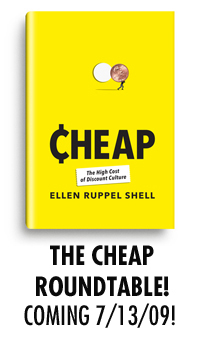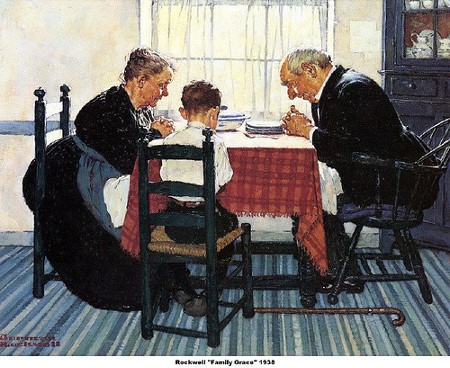Author / Edward Champion

Our July Roundtable Book Revealed!
 Ladies and gentlemen, during the week of July 13th, 2009, an intrepid team of journalists, unusual voices, first wave bloggers, and second wave bloggers will congregate on these pages to discuss Ellen Ruppel Shell’s Cheap: The High Cost of Discount Culture. We will be serializing our discussion over the course of that week and, as always, your feedback is welcome in the comments.
Ladies and gentlemen, during the week of July 13th, 2009, an intrepid team of journalists, unusual voices, first wave bloggers, and second wave bloggers will congregate on these pages to discuss Ellen Ruppel Shell’s Cheap: The High Cost of Discount Culture. We will be serializing our discussion over the course of that week and, as always, your feedback is welcome in the comments.
You might remember Ellen Ruppel Shell’s previous book, The Hungry Gene, which explored the topic of obesity from numerous angles. Shell’s latest book tackles the subject of discount culture and its impact upon American life. Yes, we’ve all been cheap bastards at some point in our lives. And the present economy has certainly forced many of us to bargain hunt. But what’s the impact of our decisions? And are there ethical ways to approach discount culture?
With our forthcoming mix of thoughts, feelings, and anecdotes, we hope to investigate some of these questions and possibly get lost in a few new ones. Feel free to tag along during the week of July 13th! The talk will indeed be Cheap!

The Geeks

The geeks in the upstairs apartment moved out. I called them the geeks because I always heard the guy drilling holes into the walls at odd hours — the working theory being that he was constructing some homemade dungeon. I once heard the Nazi theme from Day of Defeat booming through his speakers, the battle sounds rattling through that thin partition between ceiling and floor. The first geek — a dark-haired, t-shirt wearing dude around thirty — was lonely. There were prospective dates, but enough disparate intervals between women for any armchair sleuth to adduce that he never really made it past one or two invites up to the apartment. But I cheered him on. Even if I didn’t really know him aside from quiet acknowledgments in the elevator.
But eventually he got lucky and he found someone who understood him. And I was very happy for him! And she was very loud when they rattled the floorboards, sounding like a soprano just getting warmed up, the two of them going at it with the stamina of ten stallions. And he stopped playing first-person shooters. He was thankfully into first-person plural now, even if it was all quite loud. They always started around one in the morning. And he would laugh long and hard just after he came. And they would sometimes make funny childish sounds together that would reverberate through the partition.
I realize that all this sounds a bit creepy and vaguely invasive. There’s no way to convey the truth of this casual eavesdropping and come away innocent and unscathed. I fully expect some authority for decency or morality to knock on the door if my account should make the rounds. I can only say that I didn’t go out of my way to overhear these things, nor did I spend an unhealthy amount of time dwelling upon all this. But you must understand. It’s a bit difficult to ignore neighbors having sex. And you can’t exactly introduce yourself. Because your neighbors know they’re being quite loud. And you can’t exactly knock on their door with baked cookies and a bottle of scotch and say, “Hi there! I just love the way you fuck your girlfriend, and I thought maybe we might have a mixer!” This is something we never discuss in American culture. But maybe we should. Of course, if you opened up an honest dialogue with your neighbor, any reasonable person would beat the hell out of you or ensure that you spend the rest of your life on some predatory database.
They soon spent a good deal of time together. The nightly thumping became as regular as the gunshots that sometimes stirred us out of bed at three in the morning. And then the sounds stopped. They weren’t always there. Then they were. And then they were moving out to a new love shack. An ugly couch made its way to the first floor. It was initially accompanied by a note, beseeching tenants not to take it. Then the note disappeared. Presumably, the girl geek had talked some decorative sense into the guy geek. It truly was an ugly couch. So ugly and brown that nobody in the building wanted it. The couch was found outside a week later, taking hits from the rain. For all I knew, the geeks had gone at it on that couch. Maybe there was a time in which they had valued the couch. Perhaps this was furniture designed only for lost weekends.
But when the couch was gone, I knew that the geeks were gone for good. That regular libidinous rhythm had permanently disappeared. And I wondered what percussive effects might serve in lieu. Yes, time marches on. People change and move. The geeks may now be tormenting or delighting some other neighbor. But we were the neighbors designated to hear their grunts and moans! No more.
I certainly have regrets about this peripheral “relationship” with my neighbors. Why didn’t I use a decibel meter to get a precise reading of their sounds? I’m fairly confident that they defied a few noise ordinances, and good for them. Why didn’t I find out what the drilling was all about? Why didn’t I use a little know-how myself to spy through the ceiling? We cross into the unethical. And answering these questions would have taken away from some of the mystery.
Thus, I think it’s important for us not to discount the neighbors who fuck each other blue. These geeks, without even knowing it, spawned enigma and curiosity from their downstairs neighbors. And that, I would argue, is a positive achievement for the human race.

Family Disgrace

To paraphrase Eleanor Roosevelt, nobody can make you feel inauthentic without your consent. And the phony who uttered the onerous words recorded by the good and kind Don Linn should be whacked in the kneecaps. Just so the phony can decide whether or not there is indeed a metric that can be applied while excruciating pain shoots through legs I realize that these are strong words, but they are necessary ones, I think. If you cannot feel and you wish to advocate emotional capitulation, then you have no business being an expert or speaking before a crowd. For there is no strategy for living. Life simply doesn’t work that way. It isn’t a matter of taking in and emitting anthracite deposits of objective data. If you really need some hokey maxim to start with, life is what happens when you make other plans. But why settle for Werner Erhard-like comforts? If you can pretend that you know what you’re doing and you can improvise around the mad anarchy on your own terms and truly appreciate other people in the process, then you’ll probably get a lot farther than those foolishly pursuing “the metrics to assess whether you are successful.” Twitter can neither help you live better nor transform you into a better person. Like any helpful tool, it can enhance your life and direct you to the right people and permit you to exchange sound ideas and giddy concepts with people who are excited. But it is no replacement for real life. Nor is it landscape to be carved up by the avaricious marketing people. Ten conferences or twenty boot camps couldn’t possibly tell you how to stick with a vision and connect with others who have similar ambitions. Twitter, Facebook, Augmented Reality, and the flashiest technological tool shooting off the tip of your tongue can’t possibly help you understand why that person across from you is lighting up and smiling and getting excited. Your mission, should you choose to accept it, is to summon forth that same energy in yourself, find common ground, and make that passion happen, and make the passion of others happen. If Twitter can get you there, that’s fantastic. But what are you saying to the world when you tint your Twitter photo green instead of summoning up an original thought about Iran? How authentic — whether strategically authentic or genuinely authentic — are you when you’re so determined to run with the herd?
On a lighter (and possibly more disgraceful) note, here’s another interview I did with the good Austin Allen of The Abbeville Manual of Style. I do have a plan to save the publishing industry and it involves loganberry mint juleps.

The Bat Segundo Show: Guy Maddin
Guy Maddin appeared on The Bat Segundo Show #293.
Guy Maddin is most recently the author of My Winnipeg, a book version of the film of the same name. For listeners who are fans of reading and watching films, this conversation accounts for all experiences and contains more than a few prevarications.
Condition of Mr. Segundo: Reconsidering the veracity of his topography.
Guest: Guy Maddin
Subjects Discussed: Whether living in Winnipeg for many year makes one an expert of Winnipeg, expertise and confused feelings, the importance of not straying from your methods, pleasant feelings and hellish depictions of Winnipeg, the strength one obtains from retellings of Icelandic sagas, the difficulties of laughing at smallpox plagues, “My Winnipeg” vs. “My New York,” Marcel Dzama, artists doing their bit for Winnipeg, being murdered by a puck, Winnipeg purse-snatching, being indoors in Winnipeg, Canadians who are being unduly rattled by Americans, James Frey and the problems with American memoirs, finding the disclaimer, naked laps, getting a nude model in Winnipeg and Manhattan, quick cutting in Maddin’s films after 2000, title cards and Godard, walkout ratios in Maddin’s films, smelling the mildew in the tableau, live elements to Maddin’s films, J. Hoberman’s assessment, Maddin reading his own press, the IMDB, Internet ego searches, getting rid of obsessions, having to live with Guy Maddin the character, Darcy Fehr as the only actor to play “Guy Maddin” twice, the Seattle Guy Maddins, having an actor impersonate Guy Maddin at a Chicago event, why Guy Maddin hasn’t played himself, whether or not Darcy Fehr is Maddin’s Jean-Pierre Léaud, similarities between Brand Upon the Brain‘s Sullivan Brown and Antoine Doniel, redacted dialogue in My Winnipeg, Ann Savage, the OCD quality that Winnipeggers have, recurring handshakes, ramming the audience over the head, editing lessons learned from Cowards Bend the Knee, title cards, actors who performed scenes in several different languages in the early sound era, Maddin’s shift from storyboards to spontaneity, editing speed and cramming ideas, good actors vs. bad actors, George Toles’s dialogue, the official report on the Guy Maddin Casting Couch, hockey locker rooms, chorizo metaphors, walking and coming up with ideas, Guy Debord, W.G. Sebald’s The Rings of Saturn, how walking gives you courage, the advantages of sleeping in hallways and on ladders, time travel and peregrinations, the grim nature of the future, and not being a great planner.
EXCERPT FROM SHOW:
 Correspondent: If I were to say My New York, you would look at me and declare me the world’s ultimate narcissist….
Correspondent: If I were to say My New York, you would look at me and declare me the world’s ultimate narcissist….
Maddin: Yeah.
Correspondent: …and yet, when you say My Winnipeg, you can get away with that. And I think that you have a little bit of advantage being in Winnipeg and being able to say that. I really wish that I could say My New York, but I would just be looked at as if I had the biggest head in the world.
Maddin: Well, so many people have done New York too.
Correspondent: Yeah.
Maddin: I’ve got the advantage of just being among a small handful of artists doing it. The artist — the now New York-based artist — Marcel Dzama from Winnipeg has been doing Winnipeg quite a bit. I was out for drinks with him last night and we were chatting about how we’re doing our little bit to keep Winnipeg on the map. But things happen there on their own. They’re always kind of remote outpost kind of things. And stark and grizzly things. You know, someone murdered by a puck. Or Susan Sarandon’s jewel theft turned into a disembowelment. And I don’t know, a bus riding decapitation. Most recently, I just returned to Winnipeg for a couple days and the first story I read in the paper was about a gang of teenage girls who roam the streets and hack with a hatchet the purse strings of women walking around near them. One purse snatching was foiled by the purse holder flinging a cup of molten hot Tim Hortons coffee in the assailant’s face. I don’t know. There’s just this kind of stuff going on all the time. And obviously, it’s not unique to Winnipeg. But it seems like the headlines are being written by a 19th century translator of Brothers Grimm stories half the time.
Correspondent: Or perhaps some of the people who commit these crimes are doing so to alleviate the intense indoorsdom of being in Winnipeg six months of the year.
Maddin: Yeah, exactly. Cabin fever. It’s that kind of year. And they’re just writing their own legends. We don’t really — Canadians don’t really talk about their history. They don’t really boil down legends or folk tales the way every other country does. Possibly because we’ve been dwarfed so badly — rattled so badly by our presence right next to America.
Correspondent: I’m sorry about that. Really.
Maddin: No, no, no, no. It’s kind of good.
Correspondent: You don’t deserve it. There’s a lot of great things that come out of Canada.
Maddin: No, no. Whatever. You know, my temperament is part of that whole thing. And I kind of like it. I kind of like feeling like when you roll over, I should look out.
BSS #293: Guy Maddin (Download MP3)
Listen: Play in new window | Download